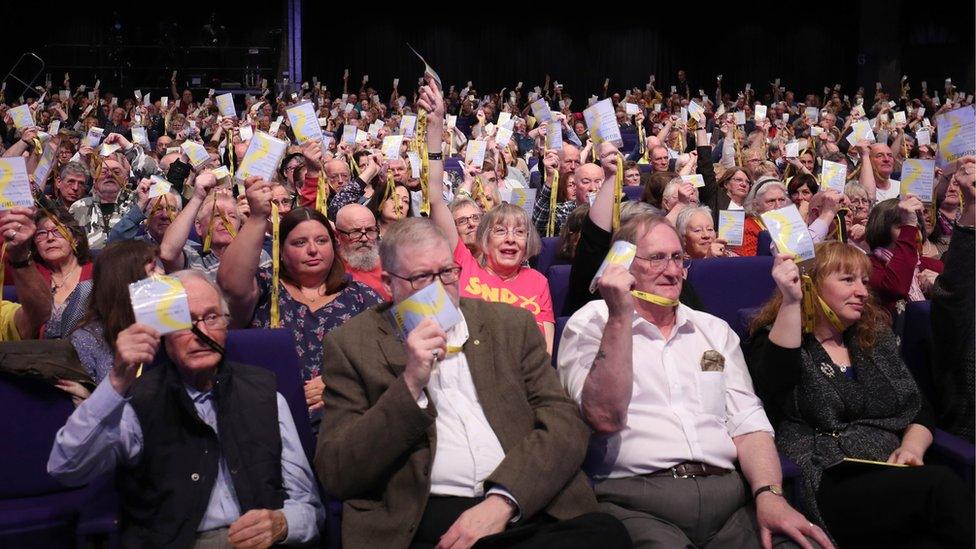Tension within the SNP's broad church
- Published

The SNP's membership has always been united around its shared goal of independence
The SNP has always been a very broad church - with congregants from the left and right.
At the SNP conference, pro-business small "c" conservatives have always happily rubbed shoulders with diehard socialists.
Within the wider Yes movement even greater political differences have always existed, but paled into insignificance compared to the greater, shared goal of Scottish independence.
Now, without a clear route map toward independence to follow, the divisions among the troops are starting to become more apparent.
Firstly there is the debate over the date of any future referendum.
Nicola Sturgeon is in no hurry. She won't say anything about that before the autumn, once the shape of the final Brexit deal is known (in theory).
But even in the unlikely event that she concludes in October that she wants another vote in 2019, the likelihood is that the prime minister would once again simply refuse.
Ms Sturgeon may be happy to bide her time until the circumstances are more favourable toward a second vote.
But many of her grass roots are getting restless. Huge rallies in recent weeks have attracted tens of thousands of enthusiastic supporters, many of whom march under the banner "Independence Now" and use the hashtag #readytogo.
Some independence supporters want a second referendum sooner rather than later
Ms Sturgeon galvanised them into action last year with her call for another referendum. And having matched them half way up the hill, the SNP leader isn't sure how to get them down again.
She would rather start a long and detailed conversation about the prospects and possibilities for an independent Scotland which is aimed at people who voted No in 2014.
The Growth Commission plans, published last month, have already prompted No voters to look at the arguments afresh, argues the first minister.
Those same economic plans have also enraged many on the left of the Yes movement, who dismiss the emphasis on deficit reduction and tight public spending as "austerity lite".
Ms Sturgeon hopes the Growth Commission report will kick start a fresh debate around independence
It may prove impossible to simultaneously reassure nervous No voters that independence is safe - while also exciting more idealistic Yes supporters about how radical it could be.
And then there is Brexit. Of course. There is always Brexit.
Since the EU referendum, support for Scottish independence has remained relatively stable around the 45% who voted Yes in 2014.
New research from ScotCen Social Research shows that the Brexit debate has significantly reshaped some people's views on independence - with support for independence now much more intertwined with attitudes toward the EU.
'New chapter'
Europhiles are now more likely to support independence - and the Brexit vote has converted some to the cause.
But Eurosceptics are now less likely to back independence, and some have deserted the Yes camp.
Ms Sturgeon will welcome delegates to the conference by telling them that the weekend "marks the start of a new chapter on Scotland's road to independence".
She will also say the SNP has "moved onto a debate about how we fulfil the potential of our country".
If recent weeks are anything to go by that may become a a very heated debate indeed.